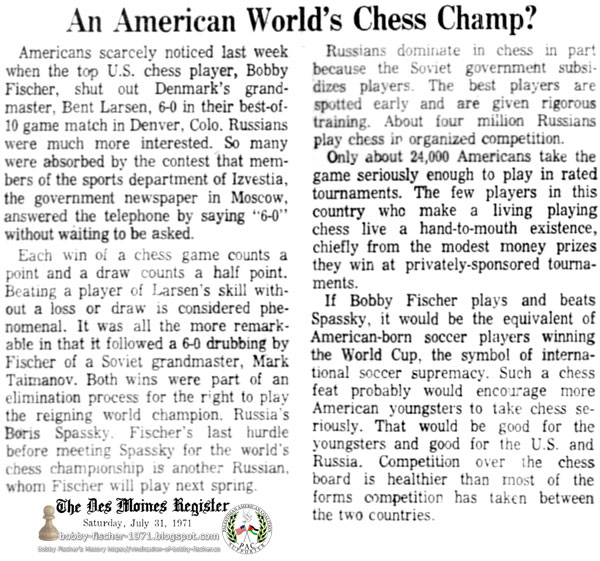The Des Moines Register Des Moines, Iowa Saturday, July 31, 1971 - Page 6
An American World's Chess Champ?
Americans scarcely noticed last week when the top U.S. chess player, Bobby Fischer, shut out Denmark's grandmaster, Bent Larsen, 6-0 in their best-of-10 game match in Denver, Colo. Russians were much more interested. So many were absorbed by the contest that members of the sports department of Izvestia, the government newspaper in Moscow, answered the telephone by saying “6-0” without waiting to be asked.
Each win of a chess game counts a point and a draw counts a half point. Beating a player of Larsen's skill without a loss or draw is considered phenomenal. It was all the more remarkable in that it followed a 6-0 drubbing by Fischer of a Soviet grandmaster, Mark Taimanov. Both wins were part of an elimination process for the right to play the reigning world champion, Russia's Boris Spassky. Fischer's last hurdle before meeting Spassky for the world's chess championship is another Russian, whom Fischer will play next spring.
Russians dominate in chess in part because the Soviet government subsidizes players. The best players are spotted early and are given rigorous training. About four million Russians play chess in organized competition.
Only about 24,000 Americans take the game seriously enough to play in rated tournaments. The few players in this country who make a living playing chess live a hand-to-mouth existence, chiefly from the modest money prizes they win at privately-sponsored tournaments.
If Bobby Fischer plays and beats Spassky, it would be the equivalent of American-born soccer players winning the World Cup, the symbol of international soccer supremacy. Such a chess feat probably would encourage more American youngsters to take chess seriously. That would be good for the youngsters and good for the U.S. and Russia. Competition over the chess board is healthier than most of the forms competition has taken between two countries.























